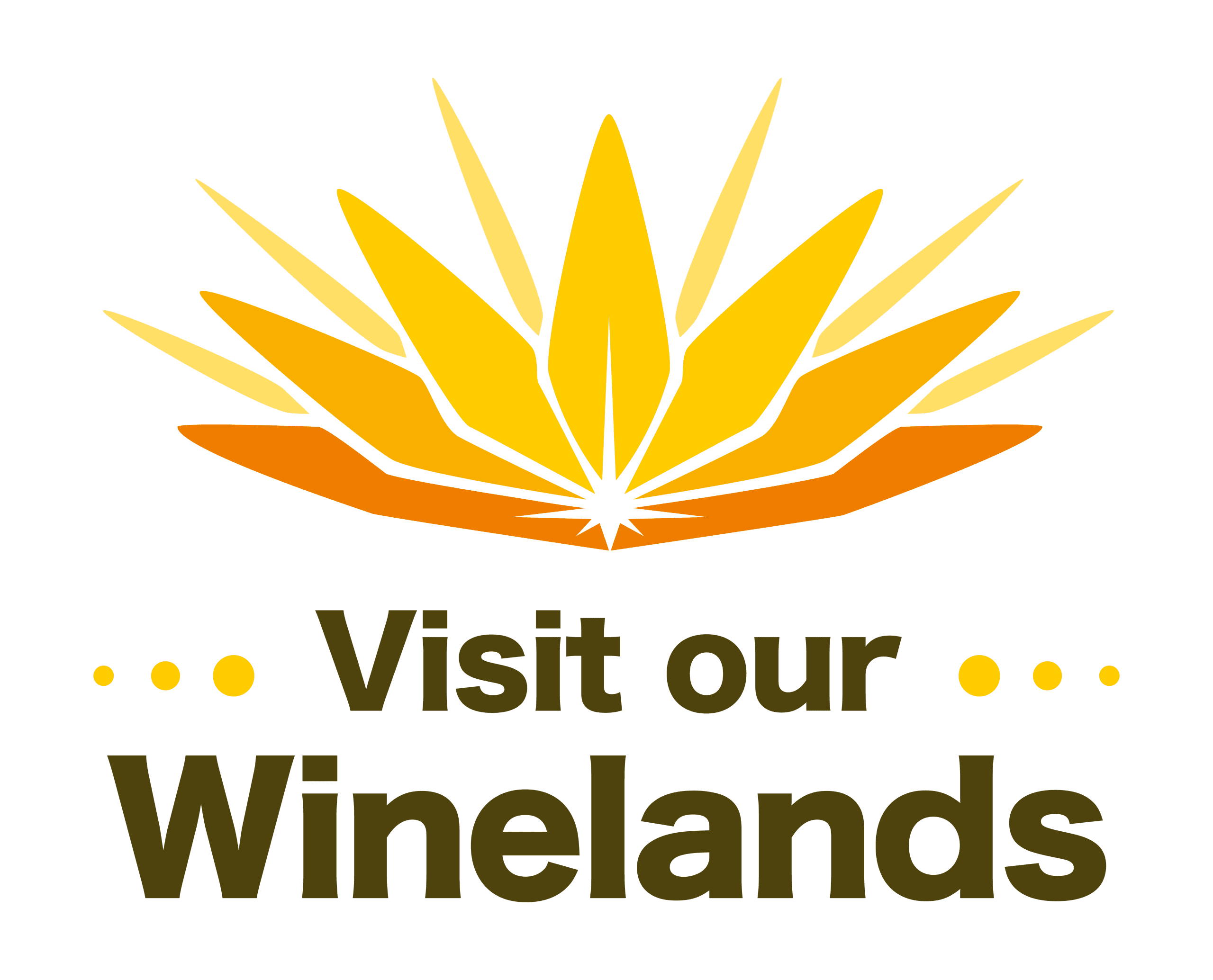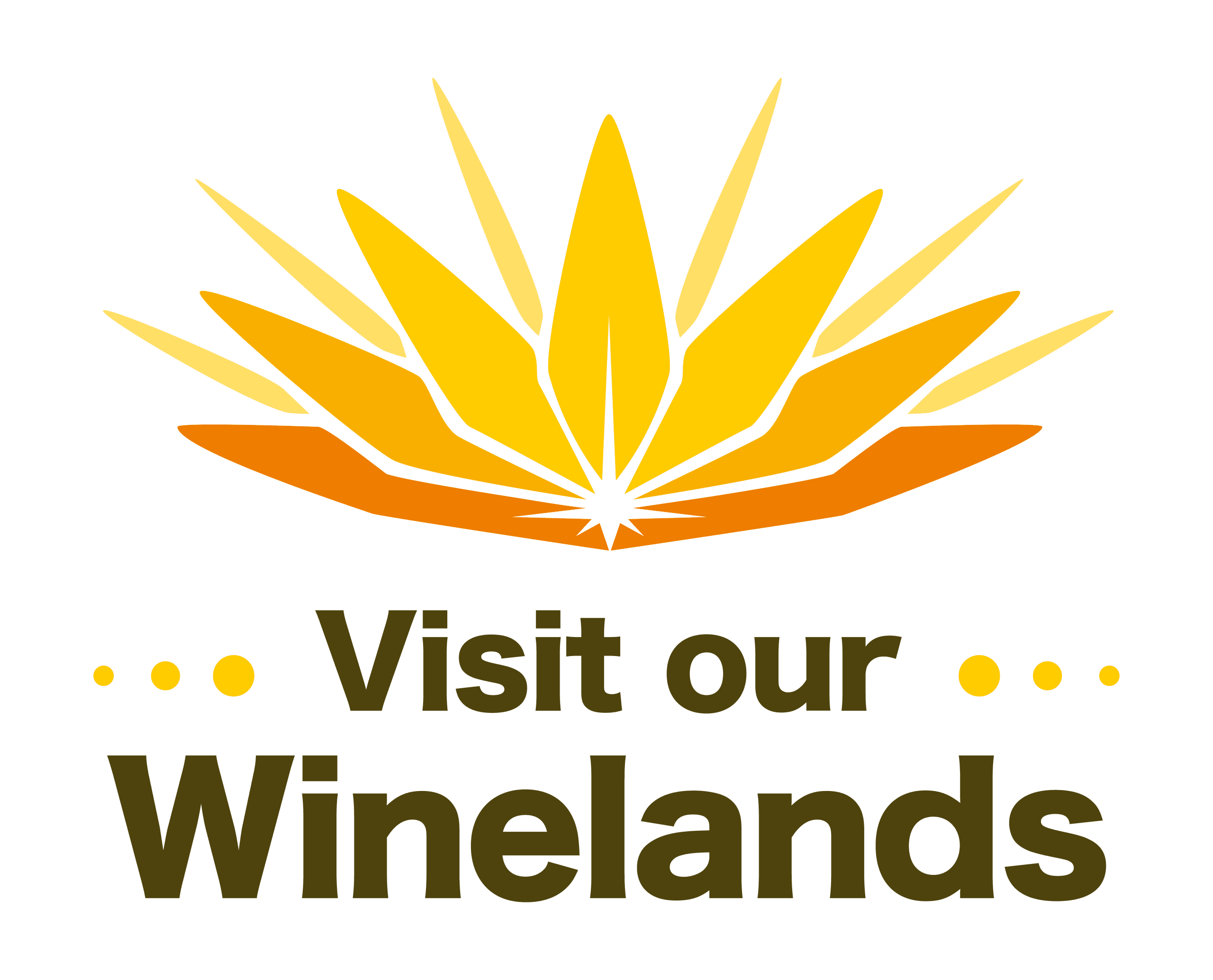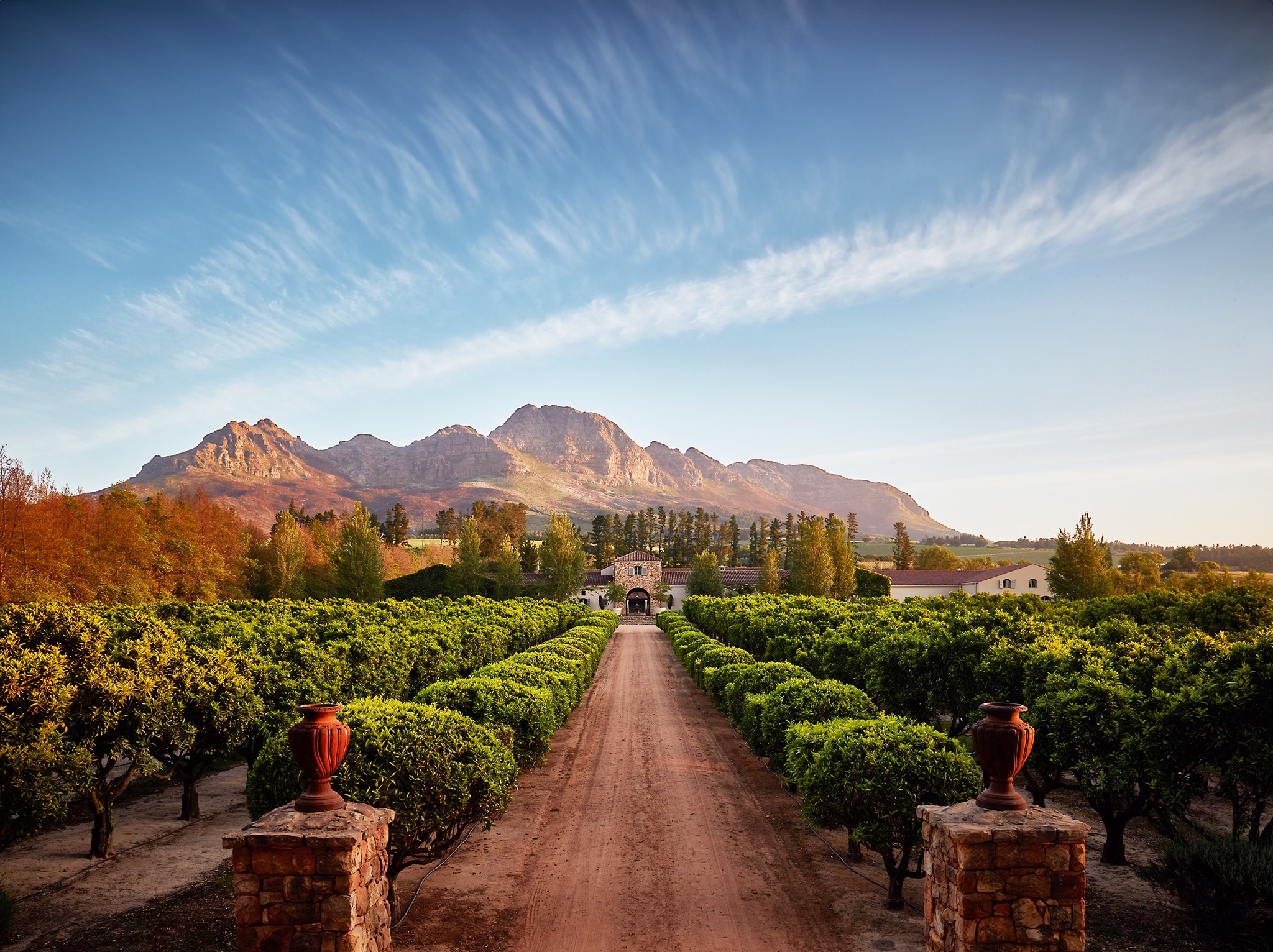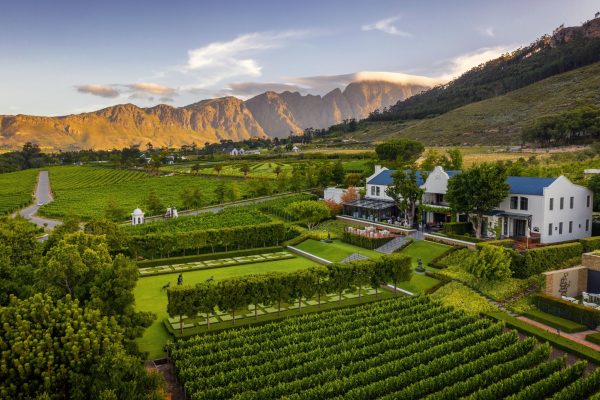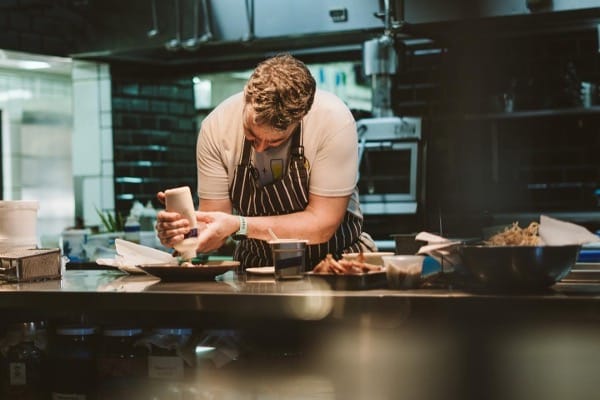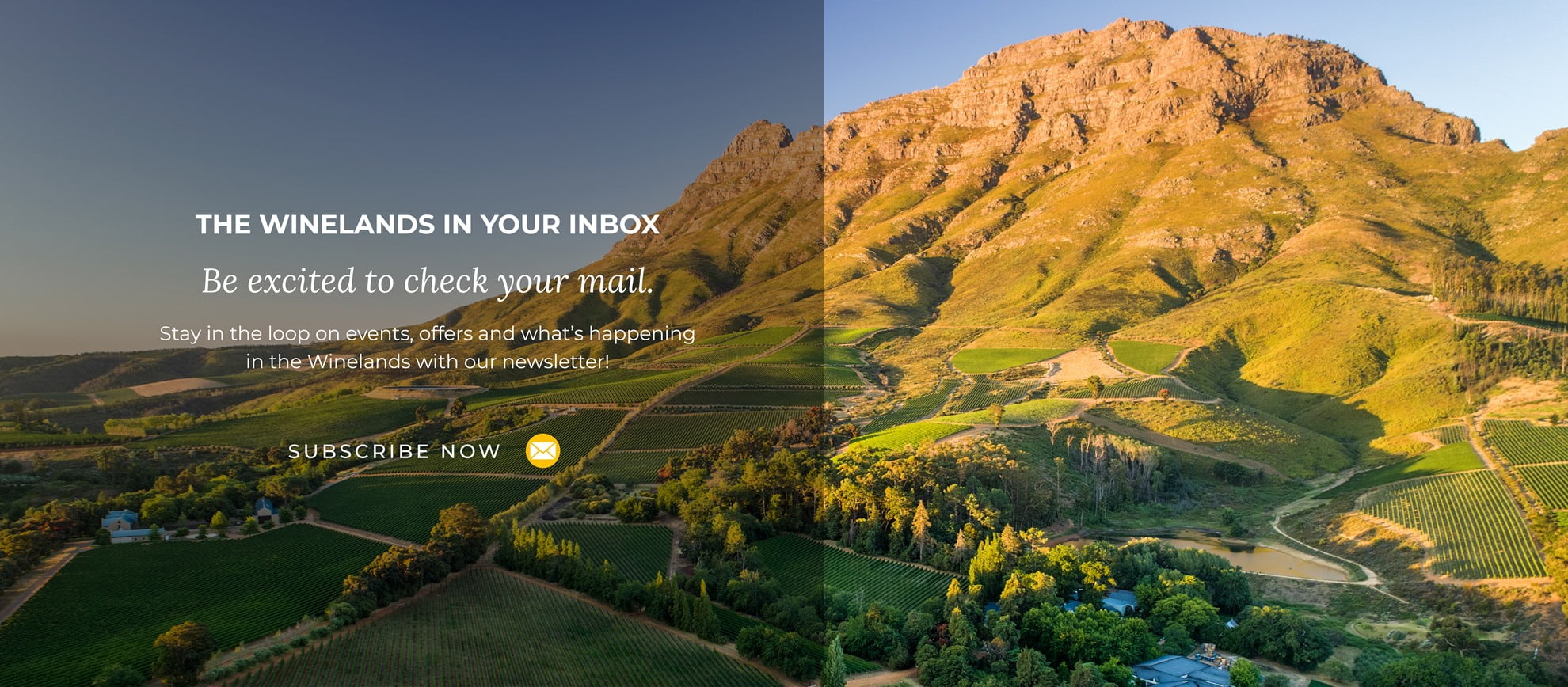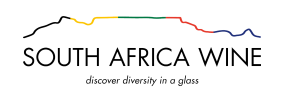National Women’s Day commemorates the march to the Union Buildings in Pretoria of 20 000 women on August 9, 1956 to petition against Apartheid pass book legislation. The march was led by Albertina Sisulu, Lillian Ngoyi, Helen Joseph, Rahima Moosa and Sophia Williams.
It changed South Africa and demonstrated the power of women in a society dominated by male voices in authority. Many of these ripples are still felt across society, including winemaking.
Norma Ratcliffe
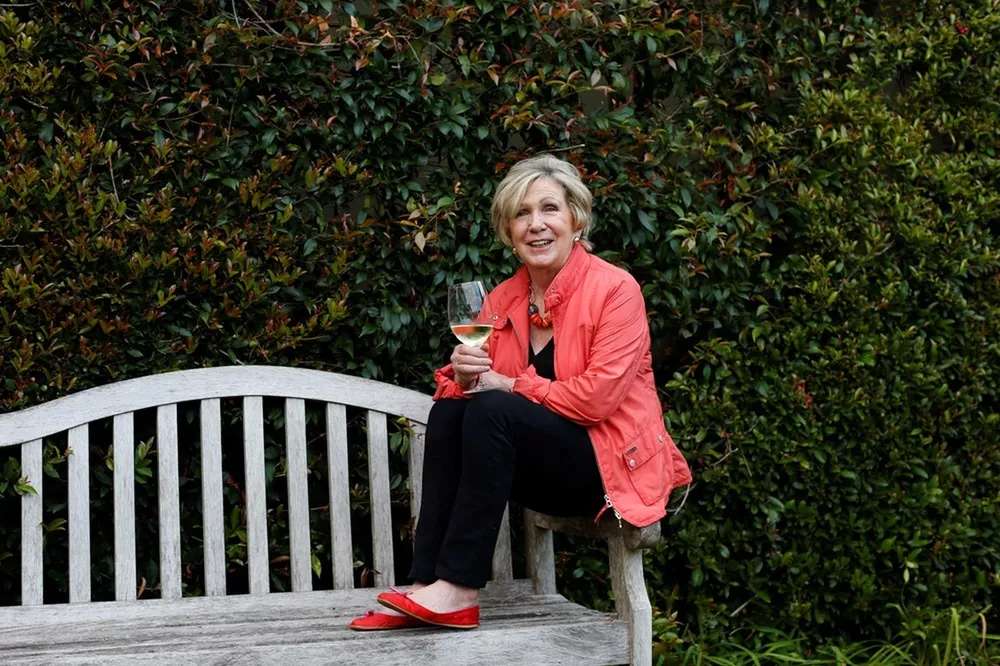
Norma has not only played a pivotal role in the success of the family-run wine estate in Stellenbosch, but in a wider sense has impacted the industry. She was the first woman to have served as chairperson of the prestigious Cape Winemakers’ Guild (CWG).
Norma paved the way for many more women winemakers to come to the fore, such as Catherine Marshall, who released the first eponymous range in South Africa to be released by a woman winemaker. Others include Trizanne Barnard, who is based on the Cape Peninsula and has her own label, Trizanne Signature Wines; and, American-born Samantha O’Keefe with Lismore Wines in Greyton.
Jamie Williams
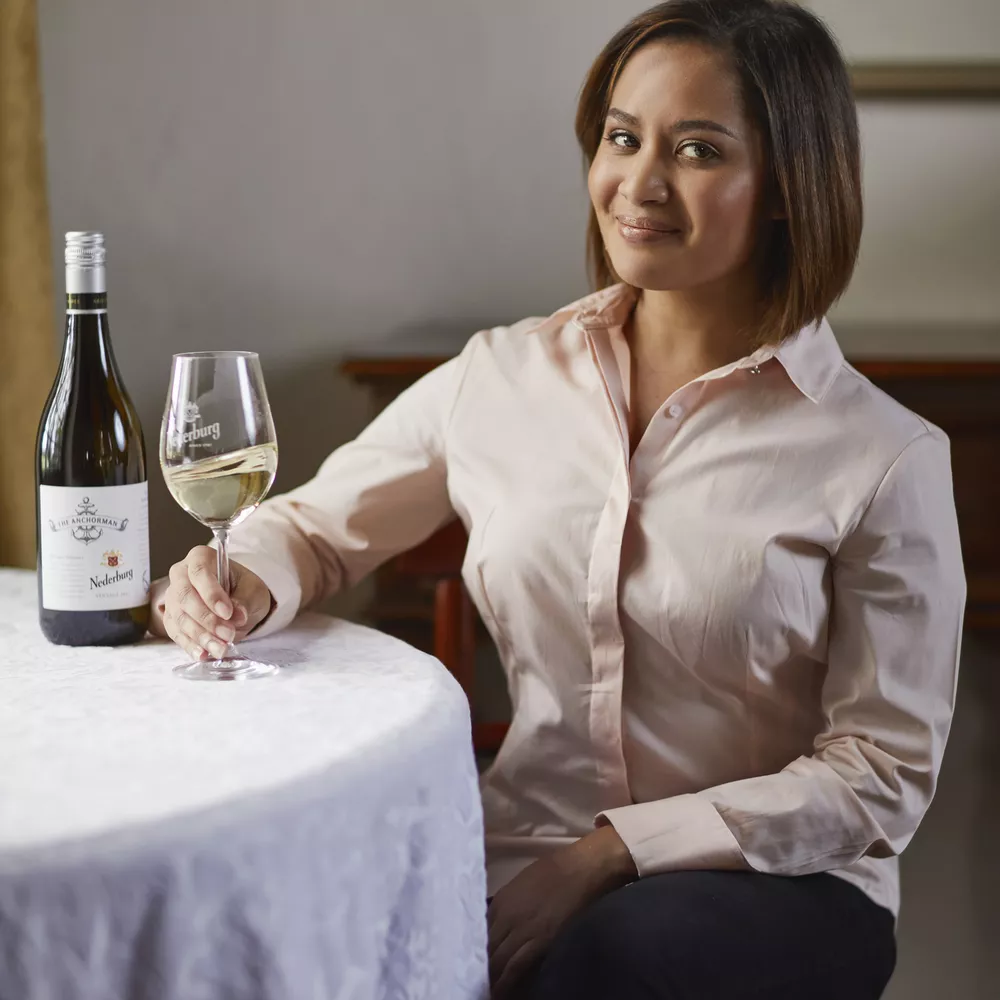
Ask Cape Flats-born Jamie Williams about her biggest challenge to date and the 27-year-old assistant white-wine maker at Nederburg in is unequivocal: “travelling internationally, on my own and having to rely on people I’ve never met!”
This from a young woman raised by a single mum and her late grandmother.
In her second year of a BSc with specialisation in Molecular Biology and Biotechnology at the University of Stellenbosch, she undertook a module on wine biotechnology. “I was captured!” she declares.
Her BSc graduation was followed by appointment in 2015 as a laboratory analyst intern at Distell’s Die Bergkelder. A year later, she became harvest cellar intern before taking on her current position at Nederburg in May 2018.
Today, much of Jamie’s outlook comes from the influence of both her gran and mom. “It’s important to love who you are and be yourself. Work hard and don’t let the past get in the way of realising your potential,” she says.
Her mom is her mentor and she says when she goes through a tough time, her mom always knows exactly what to say. “She’s so skilled in giving sound advice on how to approach almost any situation. I’ve also learnt a lot from winemaker Elmarie Botes, under whom I’ve worked for some time. She’s taught me to always be a few steps ahead, to think ahead and plan. I also find it very inspiring to hear about and read the stories of other female winemakers, especially those of colour, who have carved out incredible career paths for themselves on the South African wine industry. Hearing about what inspired them to keep pushing, what keeps them motivated on a daily basis, and how they step out into uncertainty to cement a future for themselves, really gives me the courage, strength and ideas to apply similar thinking and attitude in my own life.”
Jamie says her biggest challenge is that people still find it hard to believe that a petite, young-looking woman of colour could be a winemaker. “I want to change that narrative. Transformation is an ongoing matter that our industry is slowly coming to terms with. My biggest challenge is also being in command of a cellar team of only men, mostly much older than myself. To gain their trust and respect and to work well and communicate effectively with my team is very important to me and we are now stronger than ever before. You are only as good as your team.”
This Women’s Day she and her husband might take a hike up along the Du Toitskloof Mountain range.
Rianie Strydom
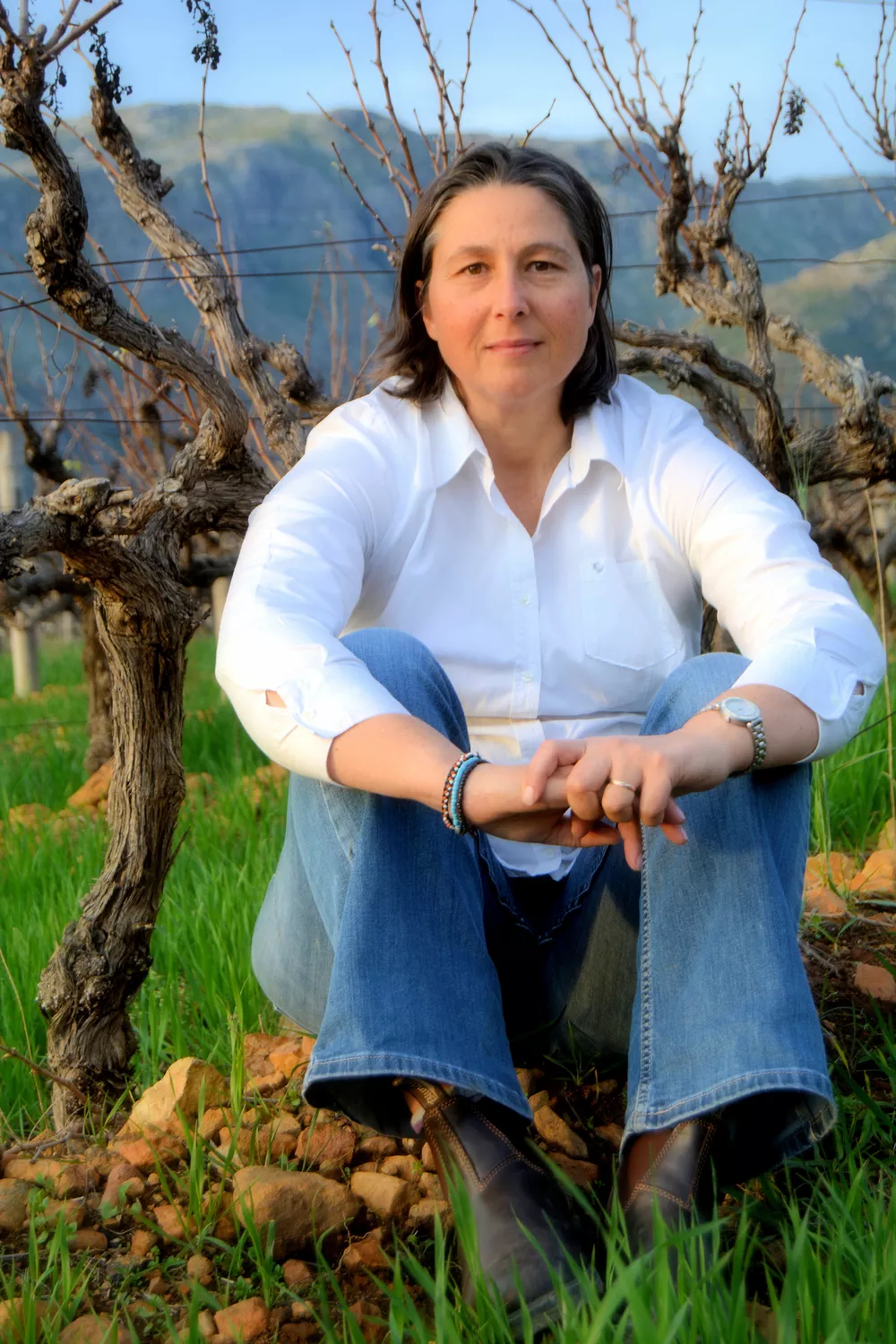
In 2010, award winning winemaker Rianie Strydom became the fourth woman to join the CWG after Janey Muller from Lemberg (first), Norma Ratcliffe (still an honorary member) and Louise Hofmeyr from Welgemeend. Andrea Mullineux is the fifth.
Rianie celebrates 27 years as winemaker this year, and spend 12 years at Haskell Vineyards. She now has her own company Strydom Family Wines.
She is grateful to say that she has had many memorable wine drinking experiences like the 1995 Château Lafite Rothchild she and her husband, winemaker Louis, opened a couple of years back. They bought it when they both did harvests in France in 1998.
During Covid, they had a bottle of 1965 Château Lynch-Bages with their children, which stands out for her
Ntsiki Biyela
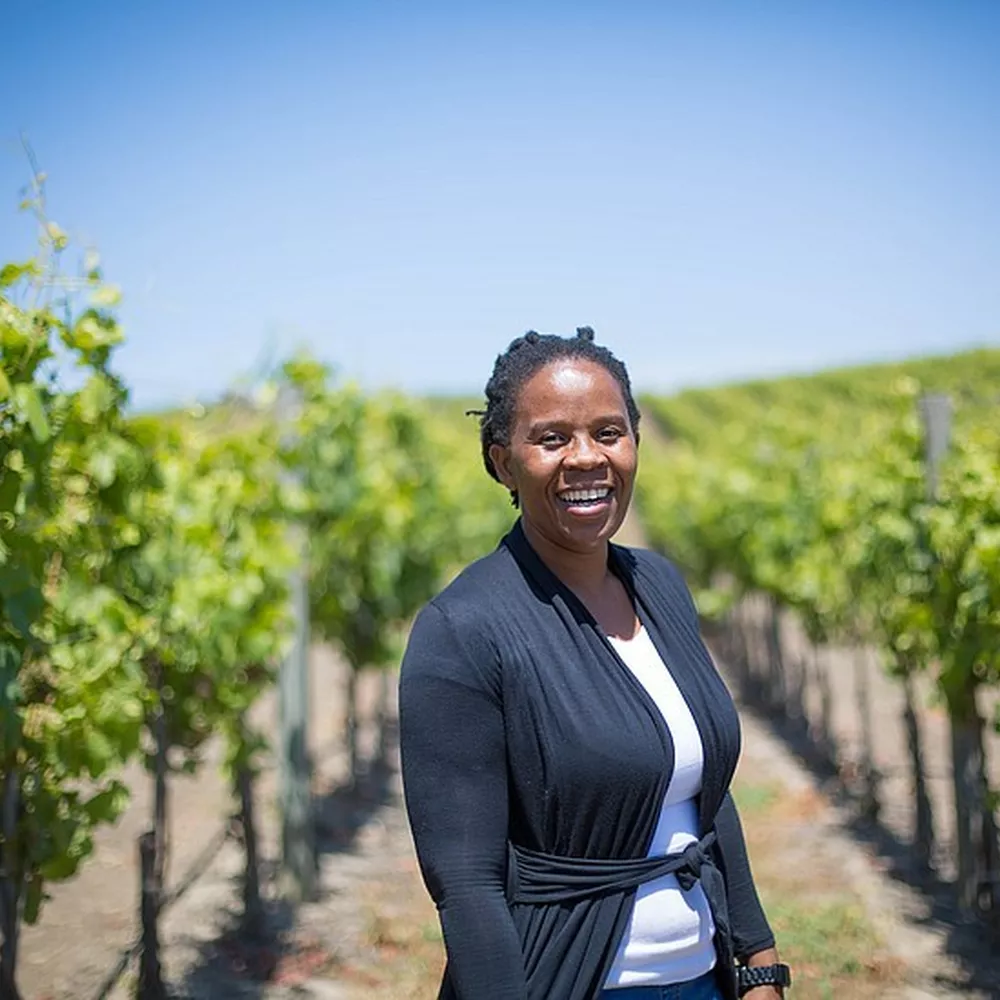
Ntsiki Biyela opened her own company, Aslina Wines in 2016 to honour her late grandmother. After qualifying at Stellenbosch University, she joined Stellekaya Wines where she became South Africa’s first black woman winemaker. It’s a title she bears with pride.
“It comes with a lot of responsibility. I also see it as a key to drive change and assist others where ever possible,” she says.
She shipped her first 12 000 bottles under her own label to the US, Germany, Taiwan and Ghana this year. There are currently four different wines under the Aslina range: Chardonnay, Sauvignon Blanc, Cabernet Sauvignon and Umsasane, a Bordeaux blend. She is currently using the Summerhill cellar facilities and buying in fruit.
She hails from KwaZulu-Natal. Jabulani Ntshangase recruited her at high school to study viticulture and oenology at Stellenbosch on a full scholarship from South African Airways. She simultaneously completed an apprenticeship at the family-owned Delheim Wines outside Stellenbosch.
Ntsiki completed harvests in Bordeaux, France and Tuscany, Italy and was selected Woman Winemaker of the Year in 2009. She has been the winemaker at red-wine boutique winery Stellekaya at Bosman’s Crossing in Stellenbosch for 12 years before starting her own label in 2014.
Ntsiki’s very first crush at Stellekaya in 2004 produced an award-winning wine, CapeCross 2004, which won a gold medal at the Michealangelo awards in 2006. She made a special trip to her home village for her grandmother to taste. She says this was her most memorable wine experience.
She says SA female winemakers must work harder than their male counterparts. “In fact, not only in wine making, but in general.”
August is a busy month for her and her brand, so no slacking off to put her feet up. “I have a lot of upcoming talks and presentations throughout the month,” she says.
Andrea Mullineux
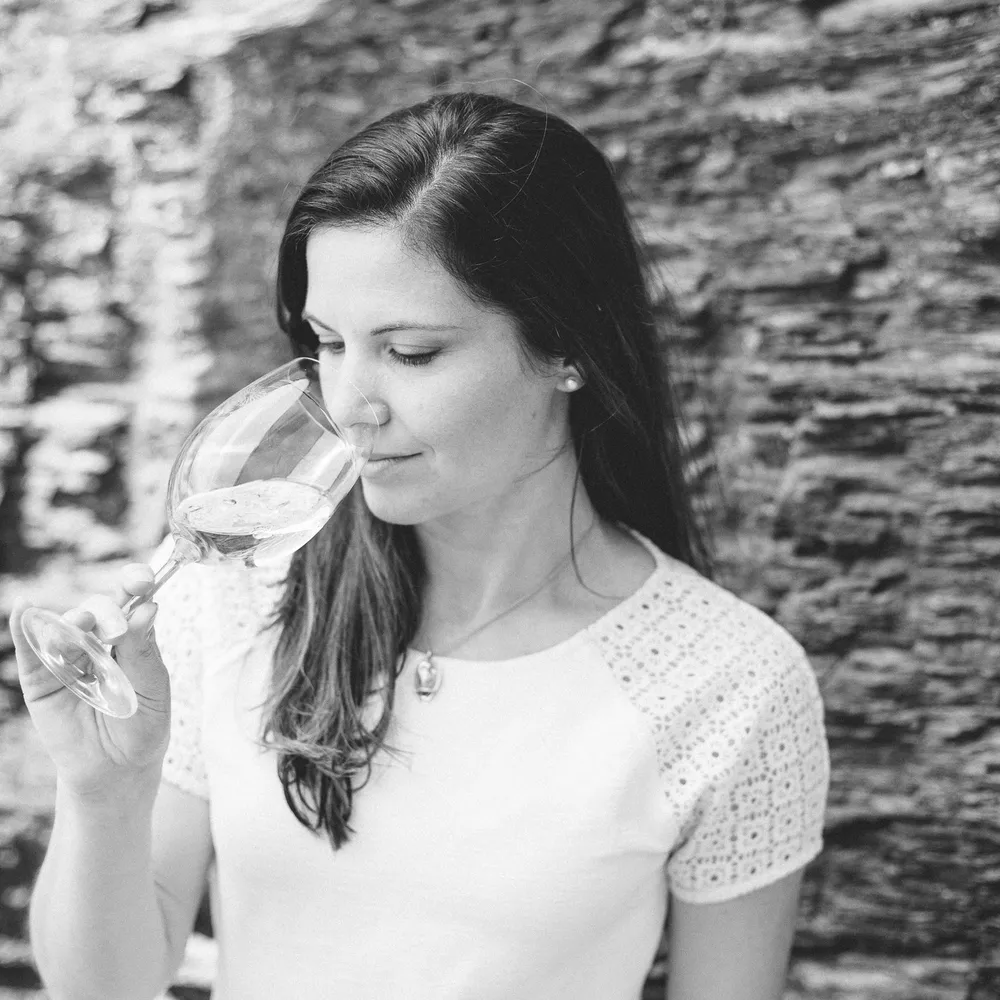
Andrea Mullineux was named the 2016 Winemaker of the Year by the US publication Wine Enthusiast as part of its annual Wine Star Awards. These awards honour individuals and companies that have contributed to the success of the wine industry and have shown “energy, courage, groundbreaking vision and business acumen”. This is the first time a South African winemaker received the honour and only the third woman winemaker winner in the 18-year history of the awards.
Andrea is co-owner and winemaker at Mullineux & Leeu Family Wines, with brands Mullineux, based in the Swartland region at Roundstone Farm; as well as a Leeu Passant, based in Franschhoek at the Leeu Estate. Mullineux also has a California brand, Fog Monster Wines.
Since the launch of the Mullineux brand in 2007, Andrea, together with her husband and co-founder Chris, has notched up 18 five-star wine ratings from Platter’s South African Wine Guide as well as being named Winery of the Year in both 2014, 2016, 2019 and 2020.
She says being named Winemaker of the Year was an incredible honour and made her proud to be making what she loves. This year, Andrea was announced as the new chairperson for the Cape Winemaker’s Guild.
“I truly believe that a rising tide lifts all boats and the award was not just for me, but really showed that South Africa has a firm place on the world’s wine stage.”
“The best thing about being a woman winemaker that I see as a huge benefit towards the wine that is created and the environment that we work in, is that women are inherently nurturing by nature,” she says. “That lends itself towards attention to detail in raising the vineyard, maturing the wine, blending barrels to bring out the best in each parcel, and savouring each drop as we know the love and work that went into it. When I make wine, I look at how each day of work from vineyard to winery will fit into the final product.”
She adds that the positive things about being a female winemaker far outweighs any challenges, “but we do approach things differently in the wine cellar”.
“Women need as much stamina, but might not be physically built the same, so we need to look at other ways of accomplishing the same tasks than our male counterparts. It is still a very male dominated industry and I always wanted to be considered a great winemaker, but I now see that celebrating that I am not just a winemaker, but a female winemaker (all while balancing work with raising a family and still finding “me time”) has led to me not just being a winemaker, but also a role model,” says Andrea. “I am constantly approached by young women asking for advice in the industry and letting me know that I inspired them.
“The reward of knowing that I have made a difference to not just the palate, but to some young women as well, makes any challenge worth it.”
She describes her most memorable wine tasting: “I get star-struck when I meet a famous winemaker whom I respect and appreciate. That person was the Italian Angelo Gaja. He was so humble when we met him and open with his knowledge. He is such an inspiration because he has involved his children to the highest degree within his company, setting it up for the next generation.”
Her own wish is to pave the way for winemakers as much as winemakers – many of them women – have helped her.
Nadia Barnard
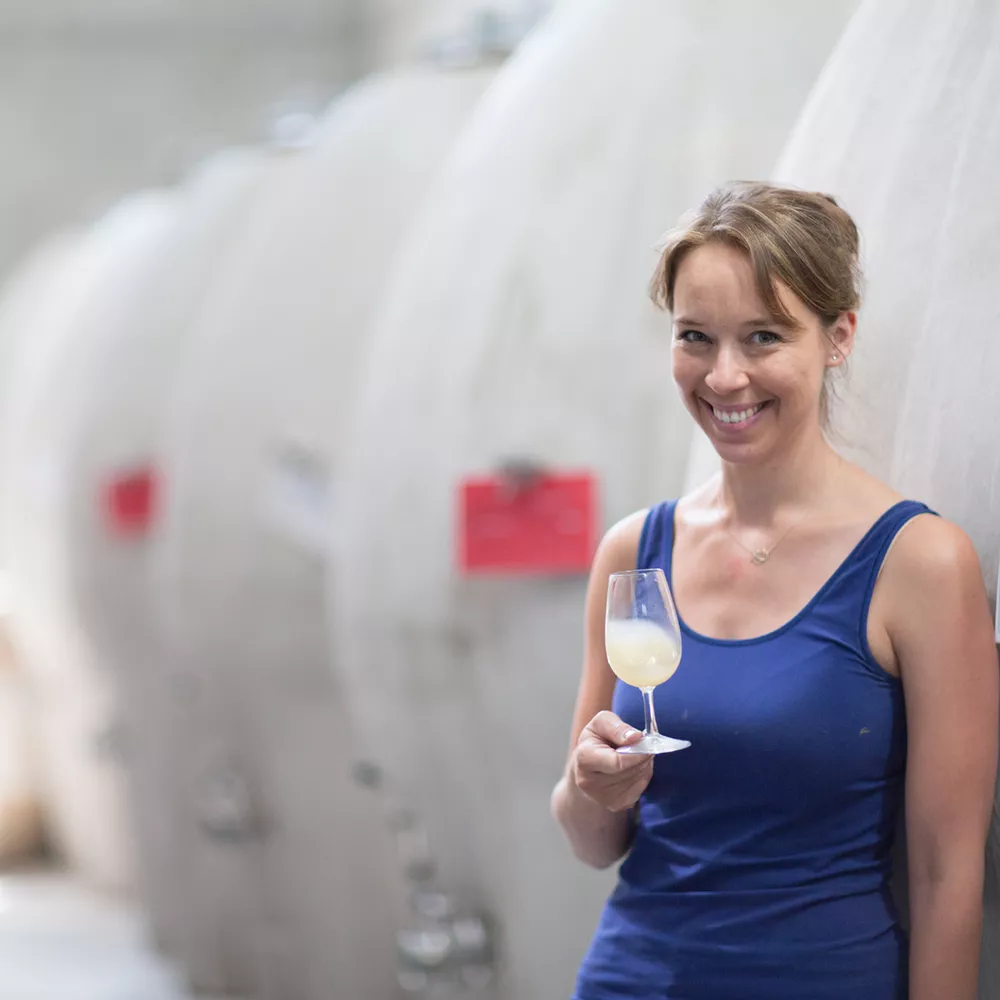
Another female winemaker is making an impression at Waterkloof Wine Estate in Sir Lowry’s Pass. Nadia Barnard has been in the industry for 14 years. “Wine has always been fascinating to me because of my parents who always showed a keen interest. It reflects the way mother nature influences everything. Nadia believes female winemakers have a different approach.
“We love aromas from a young age; smelling our mother’s perfume, cooking and so forth. We are primed, although not exclusively of course, for elegance and finesse.”
She laughs when asked about any disadvantages she may experience in a male- dominated industry. “Actually, there’s only an advantage – the men are always very happy to help!”
Cerina van Niekerk
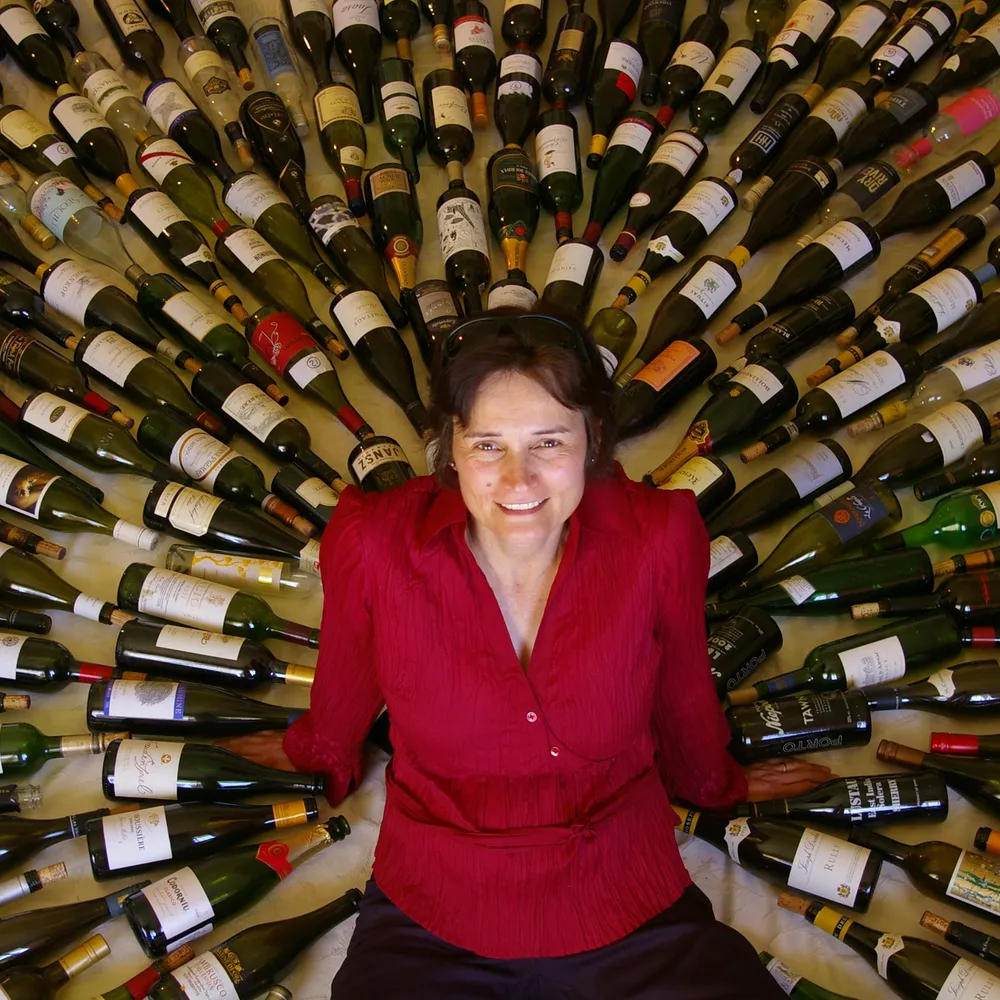
Cerina van Niekerk was the winemaker of Klawer Wine Cellars before moving to Piekenierskloof Wine Company two years ago, where she makes wine with her husband, Jaco. She also has her own wine label, Cecilia Wines, and believes that multi-tasking comes easier for women than for men – “a true advantage” as a winemaker.
She says that in her experience, women must work harder, but “as your experience increases, the acceptance increases as well”. She says it is a privilege to be a winemaker in 2018; to be able to do the work you were meant to do and “one where you have the opportunity to be inspired, challenged and where you can apply your talents and capabilities to produce something that can be exceptional”.
Her favourite wine experience was the opportunity to share a bottle of Montrachet over dinner with husband Jaco, when they were still dating. A close second was listening first-hand to the winemaker of Pichon Comtesse de Lalande, Thomas Do-Chi-Nam, on how he selects the Grand Vin of a specific year, whilst opening the component bottles and making the blend while she watched.
Jacoline Haasbroek
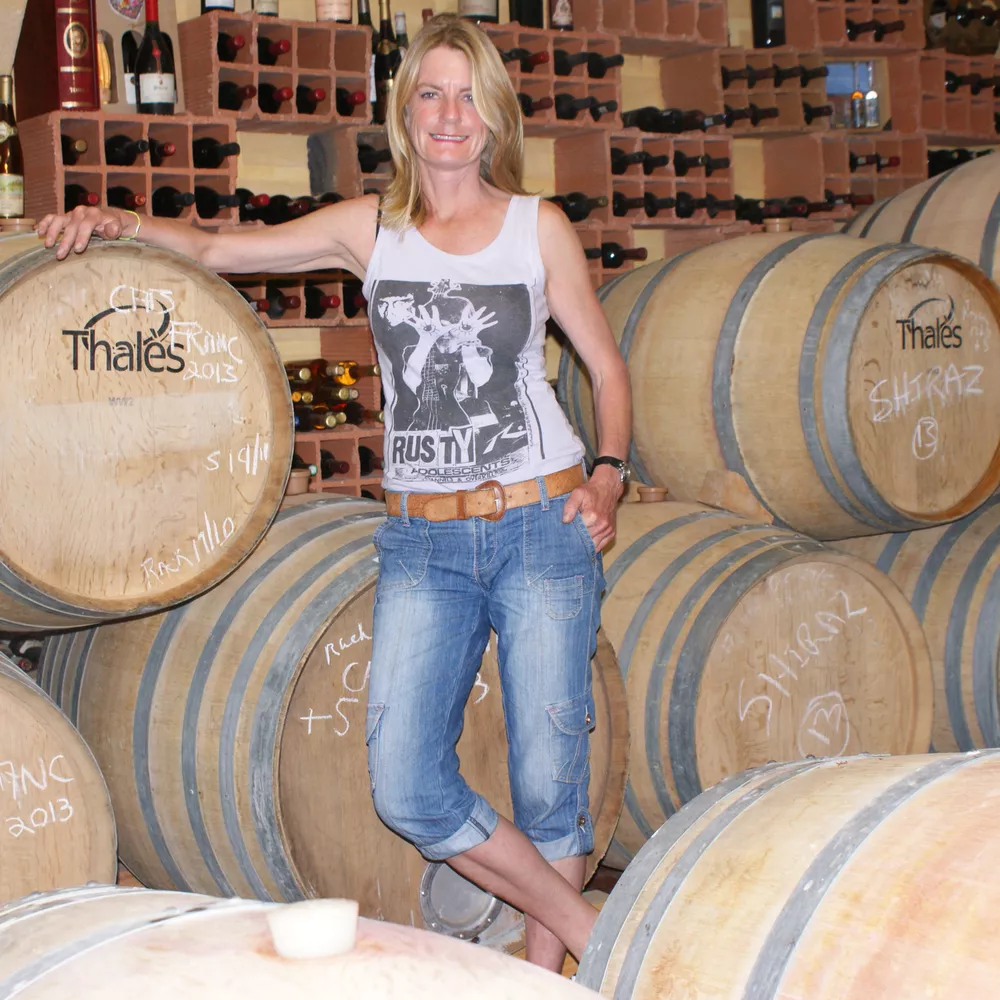
Jacoline Haasbroek, winemaker and owner of My Wyn boutique winery in Franschhoek, has been a winemaker for the past 19 years. She completed the Cape Wine Academy diploma one and two in the same year.
She remembers that she got tired of all the studying and instead of aiming for Cape Wine Masters, rather to buy in some grapes and make wine. “I itched to put the academic knowledge into practice, instead of adding another title behind my name; giving nothing back to the industry.”
Today she works with 12 different varieties. “Why? Because I am a woman. If we can do one thing, we can do many more,” she declares.
She says her big inspiration and mentor, Jean Daneel, always agreed with her wine samples, saying, “Jacoline, that may be not according to the text books, but that’s you.” She will always be grateful for his influence.
She believes women are prone to a creative, sensory streak. “We talk to our barrels; we touch and feel the grapes. We aren’t led by analysis and science alone.”
She says she does not believe gender has to play any role. “As long as you respect nature, nature will respect you. Passion is what counts.”
And how will she be spending Women’s Day this year? She says she used to be a competitive trail runner and there was a great race on Women’s Day in Swellendam. It was always her aim to win it. “With age, comes some calming down. Life is not always a race. I think every day should be a human day – no gender involved. Women do not need a date on a calendar, but I will open one of My Wyn wines for my husband this Women’s Day.”
Alexandra McFarlane
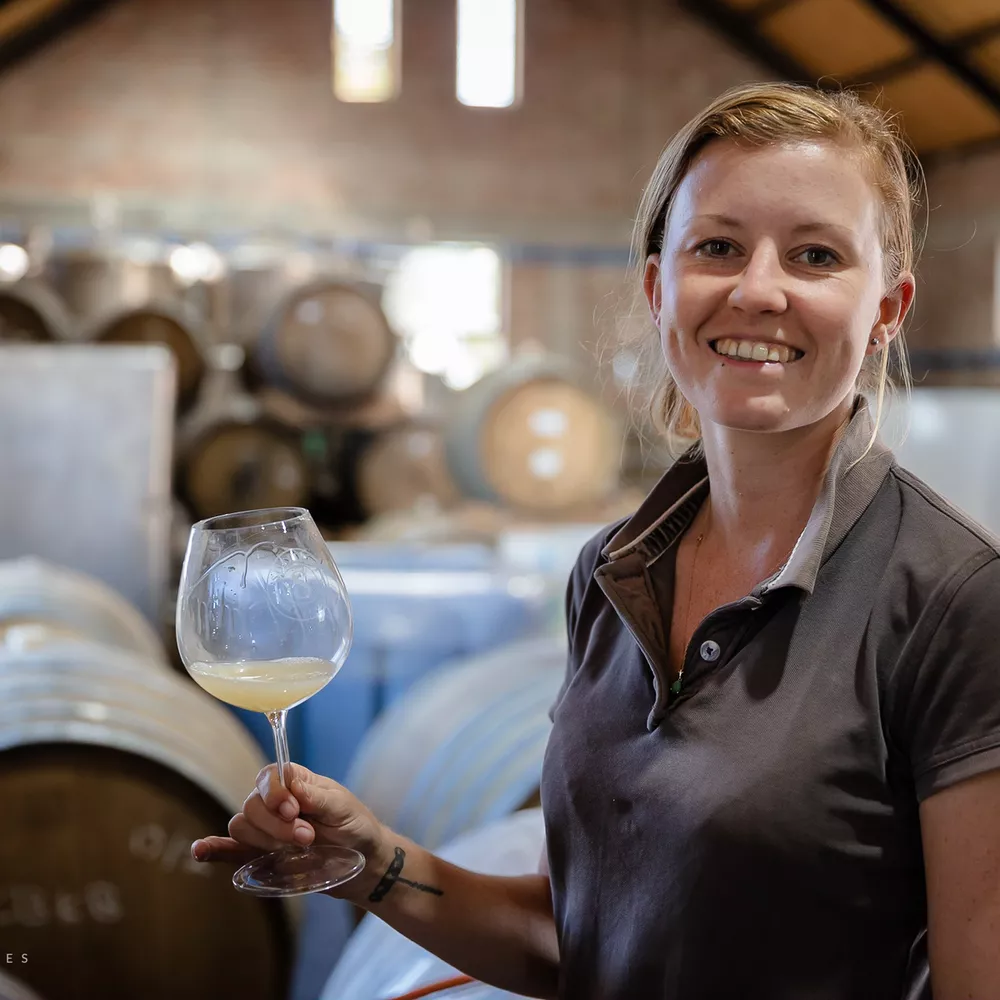
Alexandra McFarlane of McFarlane Wines has been making wine for the past ten years and spent time at Mulderbosch, Spier and Druk My Niet, before she and her husband, Wayne, and I started McFarlane Wines in 2018, when she started working full time for Real IPM South Africa while making wine on the side under McFarlane Wines.
They have just released their first wine, a 2019 old vine Chenin blanc from fruit from the Polkadraai region, Stellenbosch.
“Because we are both working full time to fund our small wine business so we will probably be spending Woman’s day grafting at the cellar or pruning a block of vines we are buying fruit from for the 2021 harvest. We have to work on our wine and tend to vineyards after hours but because it’s a labour of love, it doesn’t feel like work. We will definitely be cracking open a special bottle on Woman’s Day to toast all of the wonderful woman in our lives who have helped us get to where we are.”
She singles out a few (male and female) mentors in her career, among them Corlea Fourie at Bosman Family Vineyards outside Wellington. “What an awesome woman; I really admire her. Susan Erasmus who now works for Laffort SA is an encyclopaedia and so she has given me some awesome advice this past year. But Michael Fridjhon has by far been the biggest mentor for me and has had a huge impact on how I have grown.”
Figuring out her own winemaking style and honing her skills to a finer point has been a career highlight. She says: “Calculating an addition anyone can do, but having the confidence to make a decision based on knowledge, experience and intuition is very empowering.”
She says she is proud to be a female winemaker in SA because “we have beautiful, dynamic industry which is finding its identity”.
Salome Buys-Vermeulen
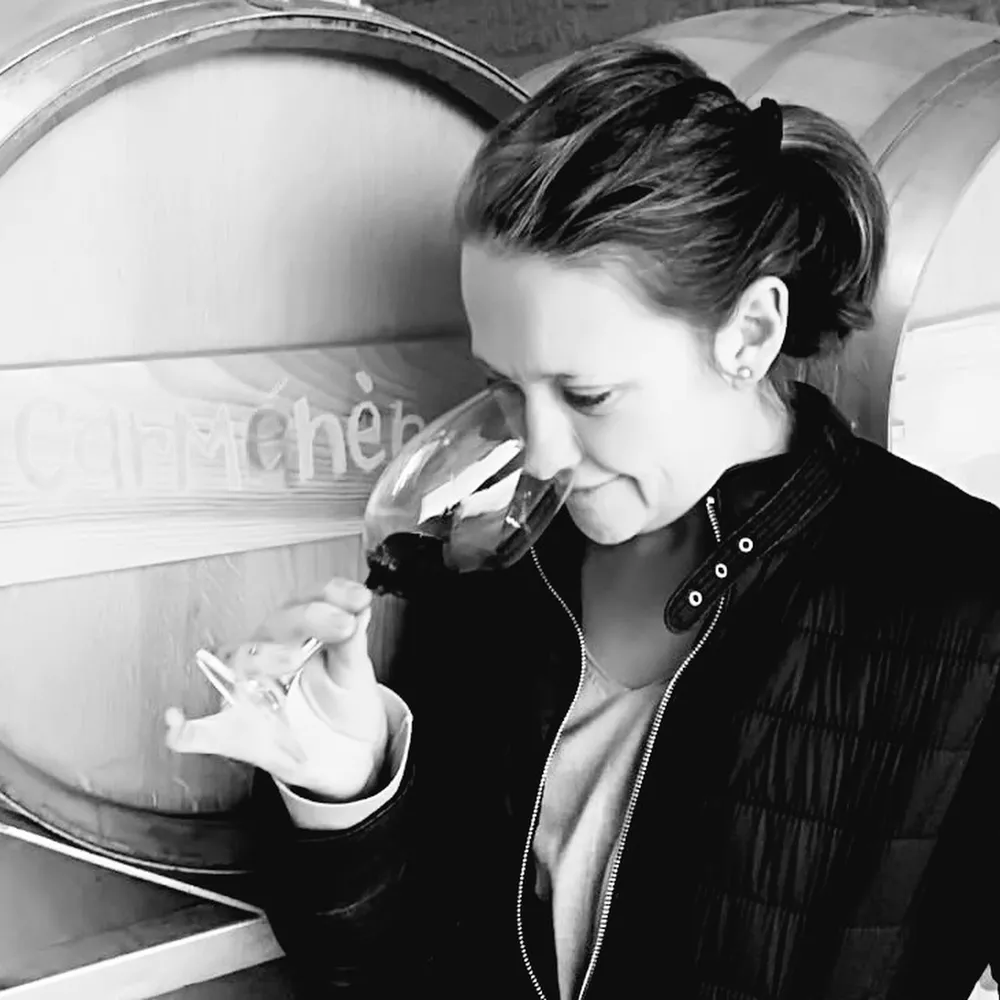
Salome Buys-Vermeulen is the winemaker at Lozärn Wines, a new wine range from Doornbosch farm near Bonnievale, whose first wines were released in December 2017. This family farm’s maiden range includes a single vineyard Carménère, Sauvignon Blanc, Carménère Rose and a special Kay’s Legacy.
She has been at the farm since 2012 and worked at Saronsberg Cellar in Tulbagh, where she met her husband. She was also vineyard manager at Ormonde Private Cellar in Darling and completed a New Zealand harvest during 2011 in Blenheim, where she learnt about Sauvignon Blanc. She also helped at Arendsig during harvest.
Her favourite wine experience was in 2012, when she drank Carménère for the first time. “So velvety, with soft tannins, and yet arrogant with spices! This was a total bowl over moment – and the reason why we decided to plant Carménère in 2014. We simply just had to see what it would do in home soils.”
Her most memorable wine tasting was in her first year when she and three friends experienced Frans Malan’s wines at Simonsig Wines. “Our friendship was still young then and together with Tammy Turc Nel (Cederberg), Alex Nel (Cederberg) and Elizma Visser (Olifantsberg), we made memories. We’re still good friends and now they’re all respected winemakers in their own right!”
Salome says her during her wine journey she learned from each winemaker and production manager that she worked alongside. “I‘ve learnt that you can always phone another winemaker. If I must single out one, it would be Lourens van der Westhuizen at Arendsig – he doesn’t know problems, only solutions.”
Mari Branders
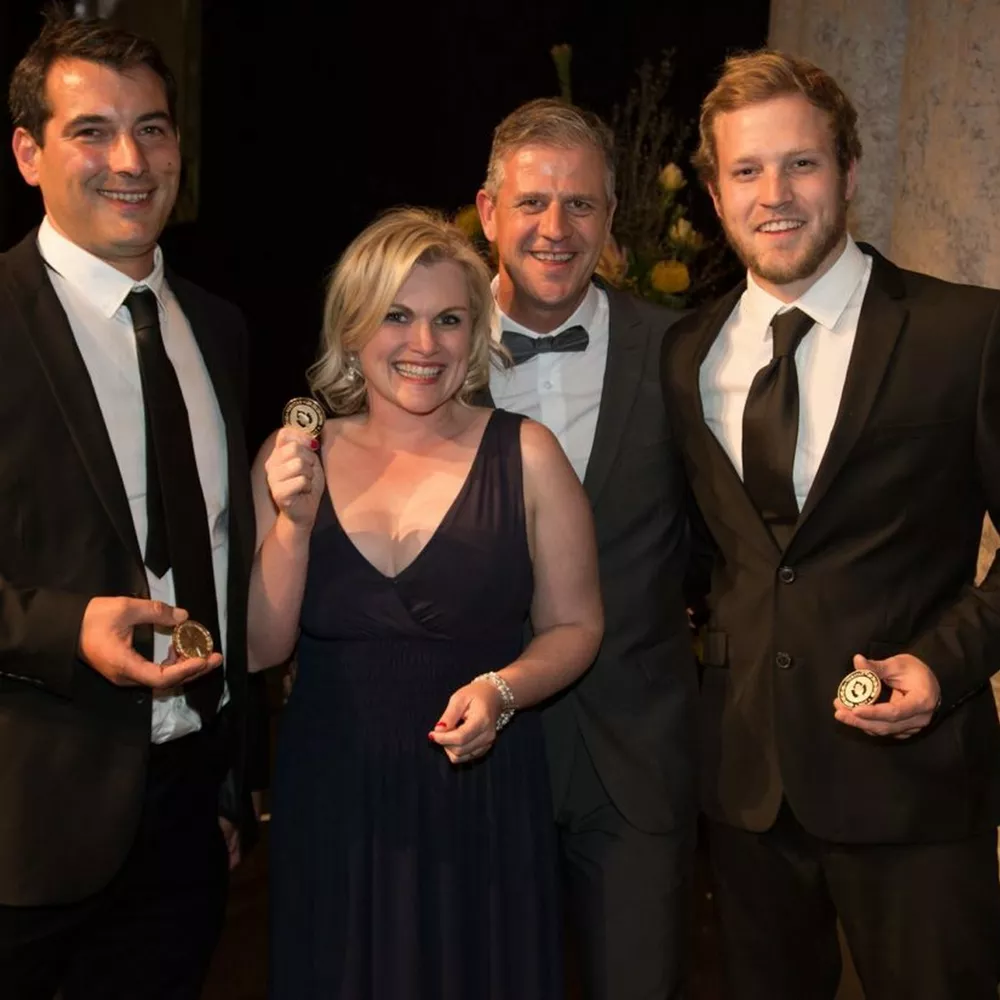
Mari Branders has been the winemaker responsible for some white cultivars and Pinotage on Diemersdal for the past 14 years. She also worked at Bovlei Wines and completed a harvest in California.
In these interesting and uncertain times we live currently, it is very comforting to work on a family farm. My work at Diemersdal is very diverse and not one day is the same and I still enjoy every day after 14 years. This Women’s Day I am spending with my family at the sea, now that we are allowed to travel in our province again.”
“I will remember the great women who helped mould South Africa and the trailblazing women who continue to lead the country forward, such as Thuli Madonsela.”
She says at Diemersdal “we are all obsessed with Sauvignon Blanc, so although I have been privileged to attend diverse tastings in South Africa, America and Europe, visiting France’s Sancerre region stands out”.
“Experiencing the wines at the home of Sauvignon Blanc, looking over the rolling vines and breathing in that unique terroir – every tasting there was a highlight. And each one in future will be. The diversity of these wines, their purity and their different styles and tastes. Absolutely mind-boggling and very inspirational for a winemaker.
“Since joining Diemersdal in 2006, the Louw family have played a major role in my life, as well as the winemakers I have worked with here. We continuously motivate and inspire each other, so mentorship from both sides will always be a part of one’s career in wine.”
Daphne Neethling

Daphne Neethling is working hard to realise the vision of PaardenKloof Estate being the first black female-owned estate winery, producing single vineyard, single varietal estate wines in South Africa.
Since 2001 Daphne and her partner has farmed Paardenkloof Estate, located at the foothills of the Babilonstoring Nature Reserve on the Bot River side of the mountain. Its hidden valley possesses unique terroir and a rich history, stretching all the way back to ancient Khoi San tribes that first inhibited the area. Daphne won both the Western Cape and National Agriculture Female Entrepreneur award last year.
She says her best wine memory is tasting their very first red wine made at PaardenKloof, a Shiraz 2008, from vineyards they planted themselves in 2003; aptly named The Long Road, after the artwork of Peter Clarke who was one of the great artists of the Overberg and whose art is featured on the labels of the PaardenKloof Peter Clarke Collection.
Daphne says working as a woman in a male-dominated world has its pros. “Women are innately resilient, and that is what is required in an extremely competitive industry layered with cultural and patriarchal nuances. Being a woman has the added advantage that people are more willing to help!”
Daphne adds women are intuitive, creative and dedicated.
“We employ mainly women to tend the vineyards since they are reliable and have a great work ethic. Women are also great at listening and building relationships and have the ability to show understanding and compassion more readily. At the same time, women are capable of making tough decisions.”
She says the wine industry presents its own set of challenges, which you overcome by learning every day. “I don’t have a mentor, but have surrounded myself with experts, such top viticulturists, to provide regular guidance.”
No rest for this lady on Women’s Day as she will be playing host to families who will visit PaardenKloof’s buzzing restaurant (and tasting room) at Ecology Lifestyle Farm along the R43, on the way to Hermanus. “Located in a country setting with farm animals, playground and nursery, people love to come out for the day. We receive great support from the surrounding areas,” she says.
Marinda Kruger-Claassen
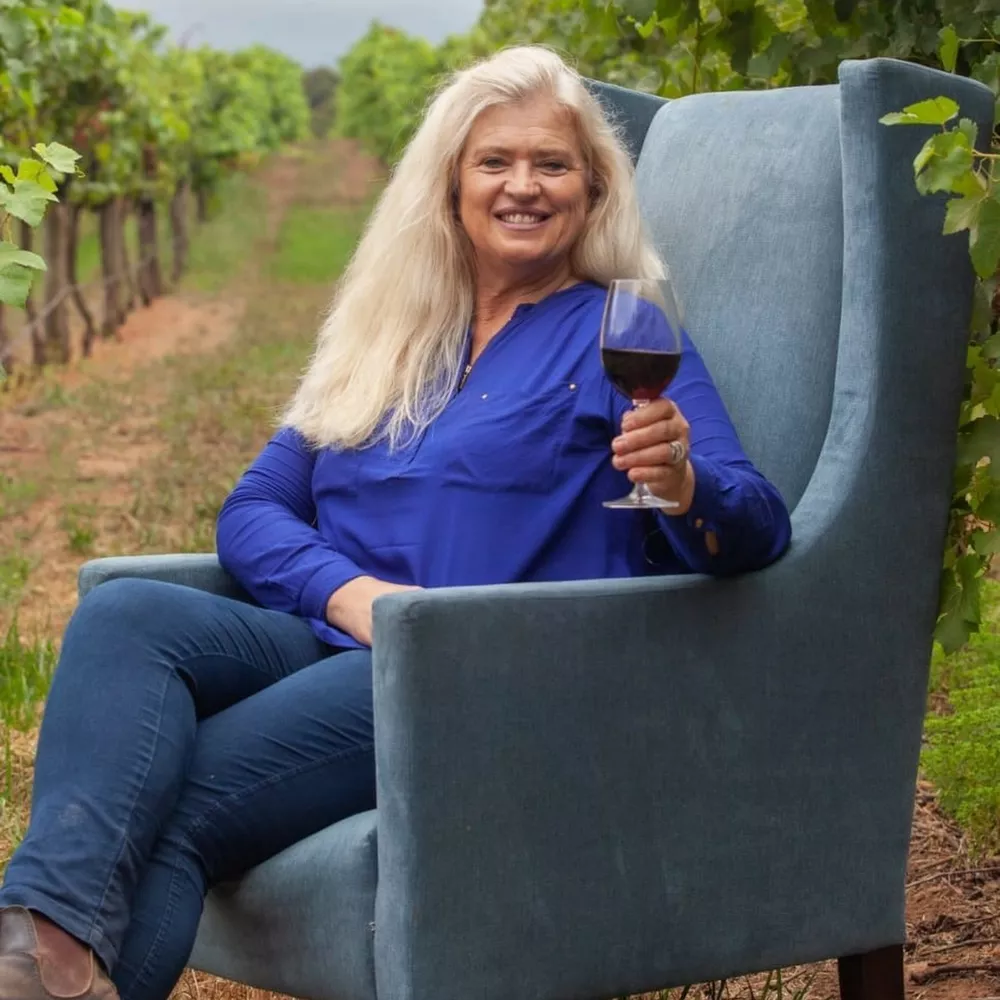
The combination of science and creativity that goes into winemaking was the “yes moment” that ignited Elgin Vintners winemaker, business manager and newest shareholder Marinda Kruger-Claassen’s passion for the industry.
She grew up in Port Elizabeth, far from the winelands, but with a love of science and soil – selling vegetables to her mother from her own garden from a young age – along with a creative bent for “making things and building things”.
Armed with a BSc in Food Science, wine entered her world in her first job as quality manager of a large international wine company, where “the wine-making process had me hooked from day one”.
“I understood the science and the logic of the process, and then I saw the impact of the winemaker on the process, the creativity that is applied, and how you can experience that effect in the end product.
“That was absolutely amazing for me – I knew I had found my niche.”
A woman with an ever-inquiring mind who believes in grabbing every opportunity that life offers – “even half an opportunity” – she started studying wine-making, achieving her Master’s in Viticulture and Oenology, and moved from her lab job into a wine-making role, travelling the world and experiencing harvests and wine-making in Europe and Australia.
“I feel very privileged for that exposure, and the springboard that it gave me.”
She had long been interested in the Elgin Valley – “an underrated area, with its cool-climate, so different to the rest of South Africa as a warm region, and its interesting wine-making potential”.
“When the opportunity to work at Elgin Vintners came along, it was not even a question for me, I just grabbed it. As a winemaker, it is a highlight for me to work in an appellation that’s absolutely unique, and that gives me the opportunity to do more research and to experiment.”
Carolyn Martin
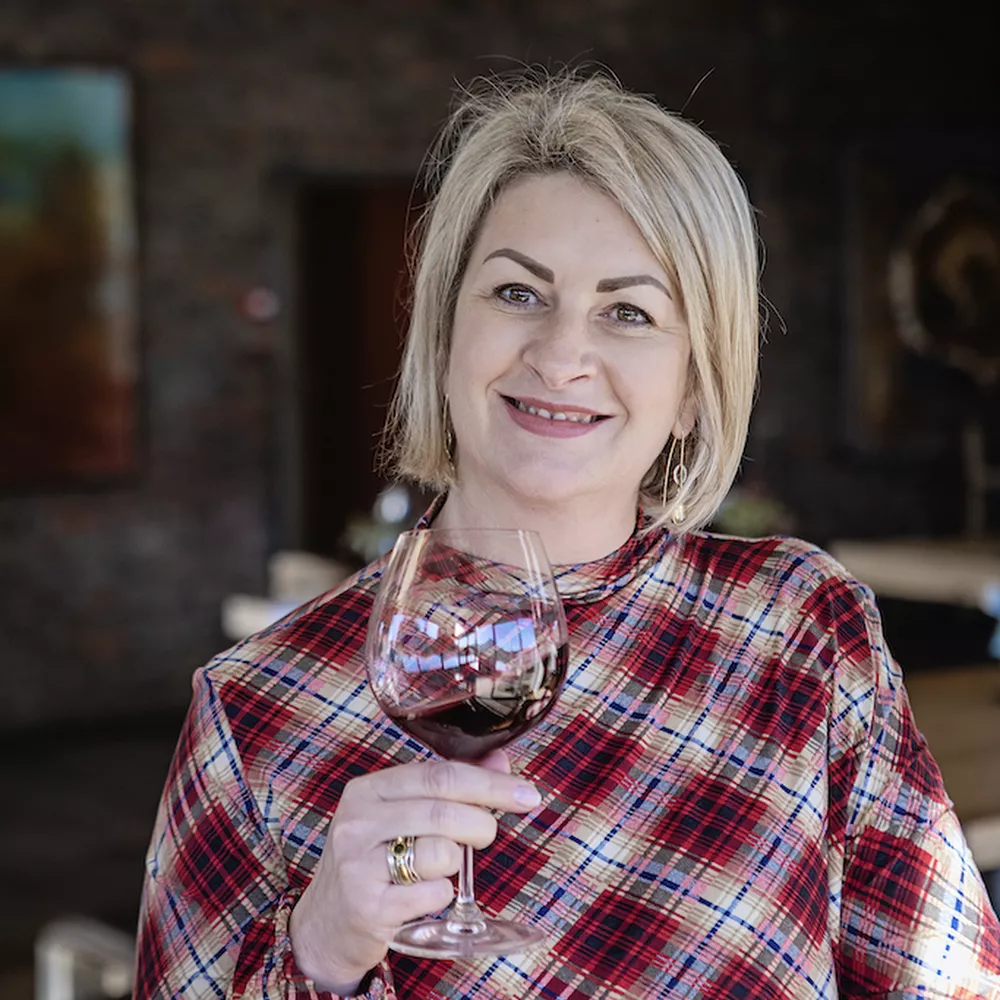
When the Swiss-born Jean-Claude (JC) and Carolyn Martin (née Finlayson) took up the challenge of establishing a winery in a remote corner of the Walker Bay Wine Region in 2002, they did so with the courage of their conviction. The 40 hectares of undulating land on the lofty Hemel-en-Aarde Ridge had never been planted to vines before, but recognising the vast potential, they set out with tenacity and determination to transform it into a model wine farm. Today Creation wines are recognised all over the world and it is one of the most famous homes of award winning South African Pinot Noir and Chardonnay.
“For both JC and me, our inspiration has been our family. We grew up in wine families and with foragers and gardeners and people who have worked the land. There were even a few academics who chose to live a rural life. For me the most important role model was my grandmother, Eleanor Finlayson, with her incredible willpower to see things through.”
Carolyn says this Women’s Day she pays tribute to four memorable women whose example and inspiration contributed in various ways to her outlook on life and to the person she has become.
“Among my fondest childhood memories are those of my paternal grandparents’ wine farm Hartenberg in the Stellenbosch region, and more specifically of my legendary grandmother, Eleanor Finlayson. We had a fantastic pantry, our own chickens, pigs and cows with a dairy. We grew a wide variety of fruit and veggies and my grandmother and I would cook up a storm. She was and still is my major role model from whom I learnt the basics of wine and food pairing.
“In 1975 our family moved to the Blaauwklippen Wine Estate where my energetic mom, Jill Finlayson, played an important role in helping to put the farm on the world wine map. In 1985 my folks bought Glen Carlou in the Paarl Valley. When the first harvest arrived there wasn’t the budget yet for a cellar; we had to make do with a garage and a chilled container. But what to do about crushing the grapes? This was where my inventive mother stepped in, suggesting we stomp the grapes with our feet – which we did quite effectively! At Glen Carlou it was also Mom’s self-imposed task to take the young interns under her wing, which is how she met my then future husband, Jean-Claude.
“Speaking of Jean-Claude: he was all of 14 years old when he decided to become a winemaker and at the age of 20 he realised this ideal! The inspiration came from his grandparents, Jules and Ida Martin, who painstakingly established the family winery on the steep banks of Lake Bienne in Switzerland way back in 1935. According to JC he virtually grew up on the side of the vineyard in a big crate, under the watchful eyes of his grandma. Even after she ‘officially’ retired at the age of 80 she still enjoyed helping her grandson in the vineyard.
This brings me to my star of a mother-in-law, Rita Martin. In a practical sense, she was the ‘organiser’ or manager of the harvest and also responsible for feeding the vineyard teams. To fuel the band of pickers, huge amounts of cheese and chocolate were consumed and she was always ready with steaming bowls of fish soup and pasta. As the anchor of the family Rita resolutely supported Jean-Claude through his early career, making sure that he never lost faith in his own abilities. It was also her steadfast belief in his South African dream that helped him (and us) to make it a reality.
Carolyn says her best wine memory is doing a tasting as a 5-year-old when she could not find her grandmother and receiving high praise from her and the guests when they did eventually find her on a cellar tour.
Carolyn says a woman bring empathy, graciousness, and a great deal of tenacity to a male dominated wine industry.
She says “I will be working this Women’s day and I am so grateful for that!”
Berene Sauls
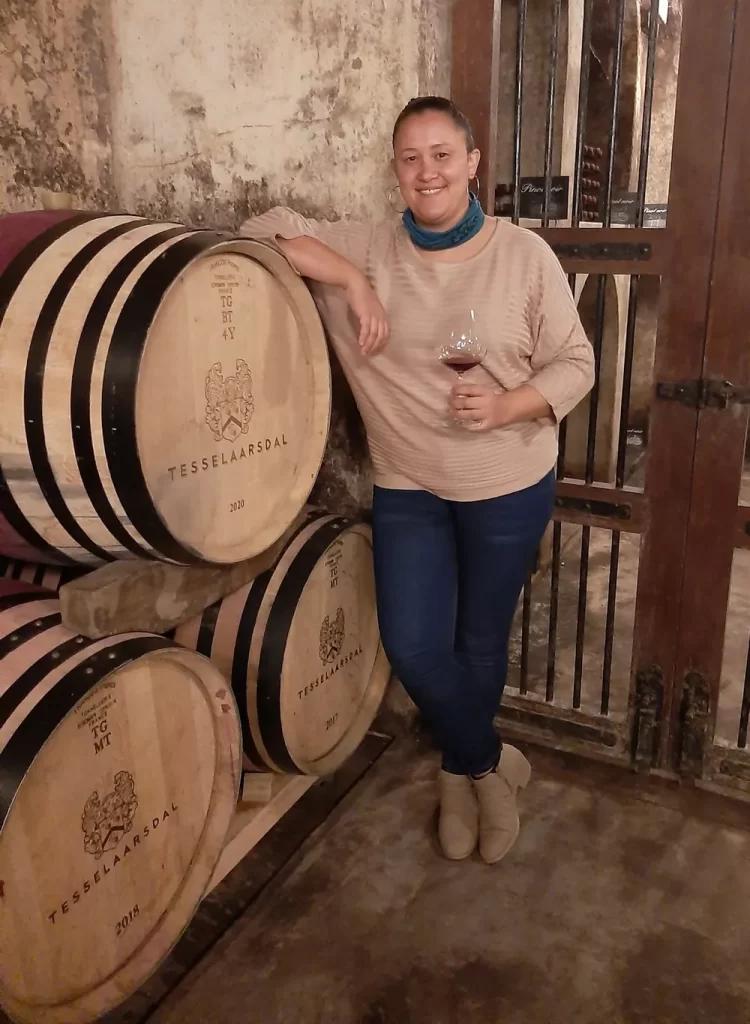
Berene Sauls, owner of Tesselaarsdal Wines, grew up in the small village called Tesselaarsdal situated near the Hemel-en-Aarde Valley, Hermanus. She joined Hamilton Russell Vineyards in February 2001 as an au pair at the age of 19 and has since worked in all the departments on the farm. Today she not only owns her own wine label, but handles Hamilton Russell’s wine exports, labelling as well as warehousing of the estate’s wines.
“Fifteen years after starting my career in the Hemel-en-Aarde Valley, Anthony Hamilton Russell offered to assist me with the wonderful opportunity to own my own wine business and join the rest of the Hemel-en-Aarde area as a producer with the expert assistance of Hamilton Russell Vineyards wine maker, Emul Ross and the Hamilton Russell Vineyards’ team.
“Grape purchases are secured with Babylon Vineyards, Hemel-en-Aarde Ridge (unirrigated vineyards) until Tesselaarsdal’s vineyards is secured and ready for harvest.”
Berene says her best wine memory was identifying Hamilton Russell Vineyards Pinot noir in a blind tasting at The Cape Wine Academy in 2002.
She says she is not intimidated by her male counterparts in the wine industry and adds the characteristics women bring to the table are that “women are more flexible, equipped with the sense of multitasking and less egoistic decisions”.
This Women’s Day she will be working as she has a few virtual meetings she needs to attend to and then she will lay back with her feet up and a well-deserved glass of wine.
Charla Haasbroek
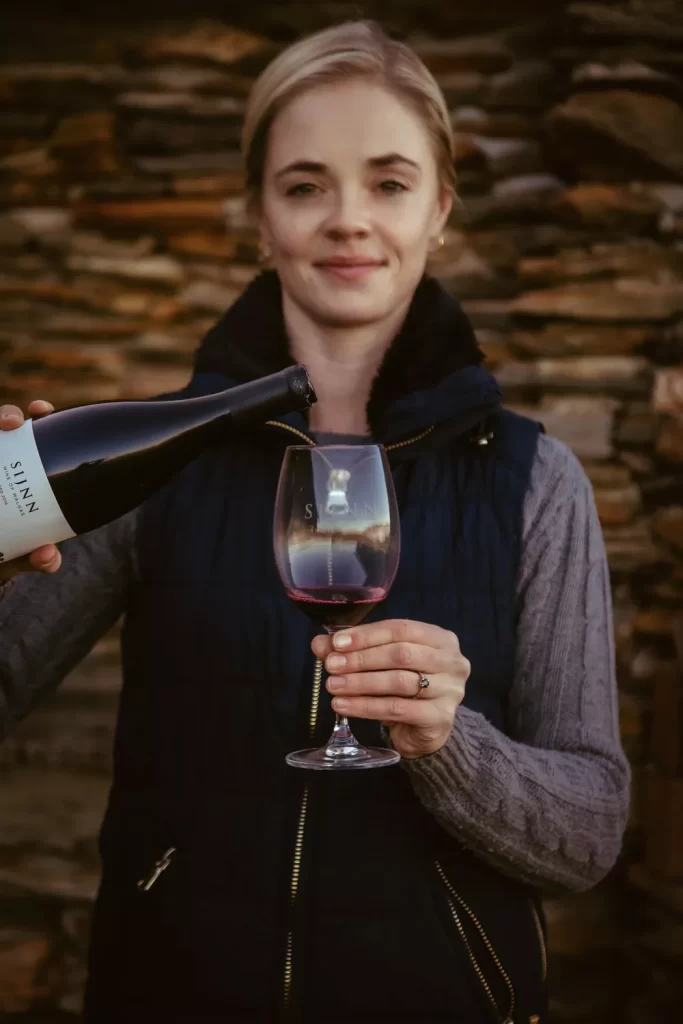
Charla Haasbroek of Sijnn Wines in Malgas, is born and bred in Johannesburg and says her parents did not drink wine, so when she announced she is going to study BSc Agric Viticulture and Oenology at Stellenbosch, it was a complete shock. “But,” she adds, “they said I get one chance to study, and I was adamant to make this chance count.”
After her studies, she completed harvests at Kanonkop and Tokara, before joining Schoon De Companje in Stellenbosch and started a wine shop with them while making wine on the side. She then worked in California and Portugal. She joined Sijnn in Malgas in December 2014.
“Sijnn has definitely challenged me in ways I never thought possible. It is extremely isolated (50km dirt road from Swellendam in the middle of nowhere, and my closest shop is an hour away) and I had to start farming which has by far been the most challenging thing.
“The farming world is still very male-dominated. You can thus imagine this young blonde girl walking around in the co-op, trying to figure out where to find some fitting for a pipe! Or walking on the farm and someone asks where the farmer is who runs the farm. When I say it is me – the looks and comments! But here I am six years later; surviving and loving what I do.”
Charla says one of the most difficult things – yet most liberating – for her as a woman, was when she had her baby and knew she had to go back to work and jump right into a harvest. “I basically survived on very little sleep every night whilst making wine, and running a household. Then I realized a woman’s body and mind is by far one of the greatest things; I just wish we truly believed in ourselves and had more confidence in what we are doing! And that is why community is so important, women praising and raising each other up!”
She has many fond winedrinking memories with her husband in France and Italy. They undertook a trip from Paris to Naples in Italy by car. “We stopped in Cote-Rotie with Xavier Gerard, he greeted us in Afrikaans and we ended up at his house eating pizza and drinking fabulous wines! Another fond memory is working in Portugal, it was the most culture-rich experience.”
Charla admires a variety of women, such as Riandri Visser at Cape Point. “That girl is a solid rock of inspiration and the realness she adds to being a woman is amazing (and we share a lot of the same struggles); Marelise Nieman (one of the most down to earth, rocking woman in the industry, making incredible wine); Hanekke Botha; Alex McFarlane; Ntsiki Biyela (this woman is just such an inspiration); Natasha Williams and Corlea Fourie at Bosman Wines and also Karlin Nel.”
Charla says she thinks as “woman we nurture by nature, and that adds so much value to what we are doing, we add a lot of detail to the process which in winemaking can only be beautiful! Our industry still has a lot of work to do and my greatest wish is that it diversifies even more and more women of different cultures and background are included.”
Editor’s Note: This post was originally published in August 2018 and has been expanded and updated for accuracy and comprehensiveness.
